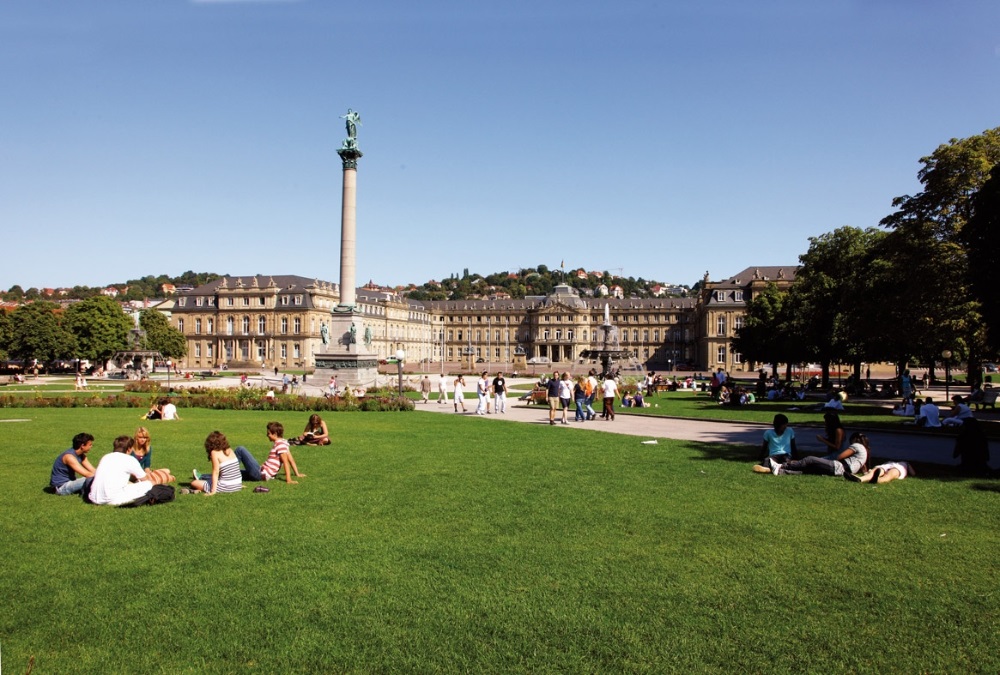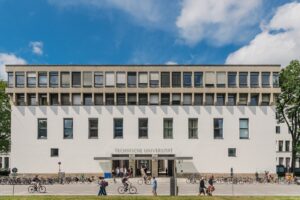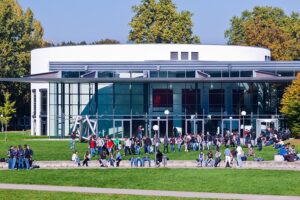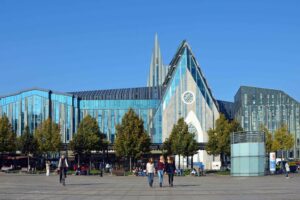
University of Stuttgart
The University of Stuttgart is a renowned research university located in Stuttgart founded in 1829 and has since grown into one of Germany’s leading technical universities. It is known for its excellent research and teaching in engineering, natural sciences, and architecture. The university offers a wide range of undergraduate and graduate programs across various disciplines. The University of Stuttgart consistently ranks among the top universities in Germany and internationally. It is recognized for its research output, academic reputation, and industry collaborations. The university’s strong performance in rankings reflects its commitment to excellence in education, research, and innovation.
The University of Stuttgart is a member of the Stuttgart Technology University Alliance, which is a strategic partnership between the University of Stuttgart, Stuttgart University of Applied Sciences, and Stuttgart Media University. This alliance fosters collaboration in research, teaching, and knowledge transfer, creating synergies between the universities and strengthening the region’s technological and innovative capacities.
The University of Stuttgart promotes internationalization and offers various opportunities for international students and researchers. It has partnerships with universities worldwide, enabling student exchanges, joint research projects, and academic collaborations. The university also offers numerous English-taught programs to attract a diverse range of students from around the world.

Research Excellence
The University of Stuttgart is internationally recognized for its research activities. It is involved in numerous collaborative research projects and has established research centers and institutes dedicated to specific fields of study. The university’s research focuses on areas such as advanced manufacturing, sustainable energy systems, mobility and transportation, computational engineering, materials science, and environmental technologies, The university has several Collaborative Research Centers (CRCs), which are long-term interdisciplinary research collaborations funded by the German Research Foundation (DFG). These CRCs bring together researchers from different disciplines to work on cutting-edge research projects. They cover a wide range of topics, including sustainable energy systems, advanced manufacturing, computer-aided engineering, and intelligent infrastructure. The university has established interdisciplinary research centers that bring together experts from different disciplines to tackle complex research challenges. These centers foster collaboration and knowledge exchange across fields such as materials science, data science, sustainability, and mobility. The interdisciplinary approach encourages innovative research and the development of holistic solutions to societal problems.
The University of Stuttgart is successful in securing research funding from various sources, including national and international research agencies, foundations, and industry collaborations. This funding supports the university’s research projects, infrastructure, and the development of cutting-edge technologies
Interdisciplinary Research Platforms
The university has established interdisciplinary research platforms that promote collaboration across faculties and departments. These platforms focus on specific areas of research and innovation, such as the Stuttgart Research Initiative on Integrated Quantum Science and Technology (IQST), which explores the potential of quantum technologies, and the Stuttgart Center for Simulation Sciences (SC SimTech), which fosters interdisciplinary research in the field of simulation technology.
Stuttgart Visualization and Interaction Research Center
VISUS is a research center at the University of Stuttgart that focuses on visualization and human-computer interaction. It conducts research in areas such as visual analytics, virtual and augmented reality, and interactive visualization. VISUS collaborates with industry partners and contributes to the development of innovative visualization techniques and applications.
Institute of Aircraft Design
The IFB is one of the leading research institutions in the field of aircraft design and aerospace engineering. It researches topics such as aerodynamics, structural mechanics, and aircraft systems. The institute collaborates with industry partners and contributes to the development of advanced aircraft technologies and concepts.
Institute for Photovoltaics
The IPV is a research institute at the University of Stuttgart that focuses on photovoltaics and solar energy. It researches solar cell technologies, materials, and systems integration. The IPV collaborates with industry partners and contributes to the advancement of photovoltaic technologies for renewable energy generation.
Advanced Manufacturing
The University of Stuttgart has a strong focus on advanced manufacturing research and education. It is home to the Stuttgart Research Center for Manufacturing Technology (PZH), which conducts interdisciplinary research in areas such as additive manufacturing, lightweight construction, and digital manufacturing. The university collaborates with industry partners to develop innovative manufacturing processes and technologies.
Robotics and Autonomous Systems
The university is at the forefront of robotics and autonomous systems research. It has established the Stuttgart Research Center for Simulation Technology (SRC SimTech), which researches robotics and simulation. The university’s researchers work on various aspects of robotics, including robot perception, control, planning, and human-robot interaction.
Sustainable Energy Systems
The University of Stuttgart is committed to addressing global energy challenges and promoting sustainable energy systems. It researches renewable energy sources, energy storage, energy efficiency, and smart grid technologies. The university’s Institute for Energy Storage Systems and the Stuttgart Wind Energy (SWE) research center are actively involved in advancing sustainable energy solutions.
Urban Mobility and Transportation
With its strong expertise in transportation and urban planning, the University of Stuttgart contributes to research and innovation in the field of urban mobility. The university collaborates with industry partners and government agencies to develop sustainable transportation systems, intelligent mobility solutions, and innovative urban planning strategies.
Interdisciplinary Research in Health Sciences
The university fosters interdisciplinary research in health sciences and biomedical engineering. It has research groups dedicated to medical imaging, biomechanics, medical robotics, and bioinformatics. The university collaborates with hospitals and research institutions to develop new technologies and solutions for healthcare.
Institute of Architecture and Urban Planning
The University of Stuttgart’s Institute of Architecture and Urban Planning is renowned for its innovative research and teaching in architectural design, urban planning, and sustainable architecture. The institute emphasizes interdisciplinary approaches, incorporating aspects of engineering, environmental science, and social sciences in its research and design projects.
Campus and Facilities
The university’s main campus is located in Stuttgart-Vaihingen, but it also has several other campuses and research facilities across the city. The university’s facilities include modern laboratories, research centers, libraries, computer clusters, and state-of-the-art equipment to support academic and research activities.
The University of Stuttgart has a comprehensive library system that provides access to a vast collection of academic resources, including books, journals, databases, and digital materials. The library offers research assistance, training programs, and interlibrary loan services to support the academic and research needs of students and faculty members.
The University of Stuttgart is committed to sustainability and takes measures to reduce its environmental footprint. It has implemented sustainable practices in energy consumption, waste management, and transportation. The university promotes sustainable behaviors and initiatives among its students and staff, contributing to a more sustainable campus and community.
Career Services and Alumni Network
The University of Stuttgart provides support and resources to help students and graduates in their career development. The university’s Career Service offers counseling, job fairs, and workshops to assist students in finding internships and employment opportunities. The university also maintains a strong alumni network that connects graduates with industry professionals, fostering professional networking and collaboration.
The University of Stuttgart has an active alumni network that connects graduates with the university community. The alumni network offers networking opportunities, career support, and lifelong learning programs. It also serves as a platform for alumni to contribute to the university’s development, share their expertise, and mentor current students.
The University of Stuttgart boasts a strong network of successful alumni who have made significant contributions in academia, industry, and various sectors. Many alumni hold leadership positions in renowned organizations, and their achievements reflect the quality of education and research at the university. The alumni network provides valuable connections, mentorship, and career opportunities for current students and graduates.
Cultural and Sports Activities
The University of Stuttgart offers a wide range of cultural and sports activities for students to engage in. It has various student clubs and organizations dedicated to music, theater, arts, sports, and other interests. The university also hosts events, concerts, and exhibitions, providing a vibrant campus life and fostering a sense of community among students, They are actively involved in the preservation and digitization of cultural heritage. Its researchers work on projects related to the digitization of historical artifacts, virtual reconstructions of archaeological sites, and the development of preservation techniques for cultural heritage objects. The university’s expertise in this field contributes to the conservation and documentation of cultural heritage for future generations.
In addition to its academic programs, the University of Stuttgart has a vibrant cultural and artistic scene. It hosts exhibitions, concerts, theater performances, and film screenings on campus, providing a platform for students, faculty, and the wider community to engage in creative and cultural activities. The university’s cultural initiatives contribute to the city’s artistic landscape and enrich the overall student experience
Entrepreneurial Ecosystem
The University of Stuttgart fosters an entrepreneurial ecosystem by supporting startups and innovation-driven ventures. It provides infrastructure, mentorship, and funding opportunities for aspiring entrepreneurs through its startup incubators and accelerators. The university’s proximity to industry hubs and research institutions in Stuttgart further enhances the entrepreneurial ecosystem and facilitates collaboration between academia and industry.
The University of Stuttgart promotes international collaboration and exchange through various initiatives. It has strategic partnerships with universities around the world, facilitating student and faculty exchanges, joint research projects, and academic cooperation. The university also hosts international conferences, workshops, and summer schools, attracting researchers and students from different countries.
The University of Stuttgart consistently ranks among the top universities in Germany and internationally. It is recognized for its research output, academic reputation, and graduate employability. The university’s strong performance in international rankings reflects its commitment to excellence in education, research, and innovation.
Language Learning Opportunities
The University of Stuttgart offers language learning opportunities to its students, including German language courses for international students and language programs for students interested in improving their language skills. These language programs enable students to enhance their intercultural communication abilities and prepare for international career opportunities.
Faculties and Departments
The university is organized into ten faculties, which cover fields such as architecture and urban planning, civil and environmental engineering, aerospace engineering and geodesy, energy, process, and bioengineering, computer science, mathematics and physics, chemistry, biology, and more.
Each faculty consists of several departments and institutes that focus on specific areas of research and education. The University of Stuttgart is home to the Stuttgart Research Graduate School (SRGS), which is part of the university’s Graduate School of Excellence.
The SRGS offers structured doctoral programs in various fields to provide comprehensive training and support for doctoral students. It focuses on interdisciplinary research and provides a platform for collaboration and networking among doctoral candidates.
International Master’s Programs
The University of Stuttgart offers a range of international master’s programs taught in English. These programs attract students from around the world and provide an opportunity for cross-cultural learning and collaboration. Some of the international master’s programs cover areas such as automotive engineering, computational mechanics, infrastructure planning, and sustainable urban planning.
Master of Science in Advanced Construction and Building Technology
This program focuses on advanced construction techniques, sustainable building materials, and digitalization in the construction industry.
Master of Science in Computational Mechanics of Materials and Structures
This program explores the numerical simulation and modeling of mechanical behavior in materials and structures.
Master of Science in Integrated Urbanism and Sustainable Design
This interdisciplinary program addresses the challenges of urban development and sustainability through design, planning, and policy approaches.
Master of Science in Water Resources Engineering and Management
This program covers topics related to water resources management, hydrology, water supply, and water treatment.
Master of Science in Aerospace Engineering
This program provides advanced knowledge in the field of aerospace engineering, including aerodynamics, flight mechanics, and space systems engineering.
Master of Science in Communications Technology
This program focuses on advanced topics in communication systems, including wireless communication, network protocols, and signal processing.



